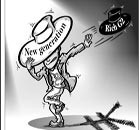Government and Policy
Corruption hot topic at session
(China Daily)
Updated: 2010-02-26 07:29
 |
Large Medium Small |
As China's top legislature, the National People's Congress (NPC), readies for its annual meeting in Beijing early next month, public interest is running high.
An online survey by www.people.com.cn, an influential news portal in China, showed that corruption is the most important issue netizens want the NPC to address.
Other issues netizens want the session to tackle are the widening gap between rich and poor, the skyrocketing cost of housing, the country's health system, pensions and education.
In another online poll, 70 percent of respondents urged officials to declare their assets and emphasized the role of the Internet in preventing corruption.
This is the third consecutive year corruption has been the top issue on the eve of the NPC meeting.
The past few months have witnessed an unprecedented crackdown on corrupt government officials. Huang Songyou, former vice president of the Supreme People's Court, received a life sentence in January for embezzlement and taking bribes of 3.9 million yuan ($574,000) in exchange for favorable court rulings.
Huang was the first top judicial official convicted on corruption charges.
Ten days later, Yu Renlu, former vice chief of the Civil Aviation Administration, was sacked and kicked out of the Chinese Communist Party (CPC) for "serious violations of discipline and law".
Yu was found to have used his position to benefit other people in return for "large sums" of bribes, according to a statement jointly issued by the CPC's Central Commission for Discipline Inspection (CCDI) and the Ministry of Supervision. His case has been referred to prosecutors.
In February, a key figure in the high-profile mob trials in Southwest China's Chongqing municipality stood trial. Wen Qiang, former deputy police chief and director of the justice bureau in Chongqing, was accused of rape, taking more than 15 million yuan ($2.2 million) in bribes to protect criminal gangs and possessing a large amount of unexplainable assets.
The massive eight-month anti-gang crackdown in Chongqing uncovered judicial corruption, with 200 judicial and public security officials implicated, said former Chongqing mayor Wang Hongju.
A press briefing by the Ministry of Supervision in early January revealed that in the first 11 months of last year more than 106,600 officials were either punished by the CPC or underwent administrative discipline. The ministry also said 4.44 billion yuan ($653 million) in public money had been recovered.
During the 11 months, the CCDI received 1.3 million tip-offs on alleged corruptions, of which 140,000 cases were confirmed. Some 3,743 officials at county level and higher were punished for graft last year, with 764 prosecuted. Compared to 2008, this number was a 10.8 percent rise.
In addition, the number of corrupt officials punished for embezzling more than one million yuan ($147,000) increased by 19.2 percent.
According to Gan Yisheng, deputy chief of CCDI, investigations mostly focus on malpractice related to the implementation of major government policies on expanding domestic demand to boost economic growth, as well as food and drug safety, environmental protection, land requisition and house relocation.
Bribery and corruption cases related to construction projects, land development and mineral resource exploration that prompted mass protests were also investigated.
"Corruption is more often than not the result of abuse of power," said Ma Huaide, vice president of the University of Political Science and Law. He believes that effective prevention and punishment of corruption depends on the improvement of laws that restrict and regulate power, as well as their implementation.
Statistics released by the Ministry of Commerce show that in the past three decades some 4,000 corrupt officials have run off with more than $50 billion of public money to Canada, the United States, Australia, and other countries.
Xinhua
(China Daily 02/26/2010 page6)







